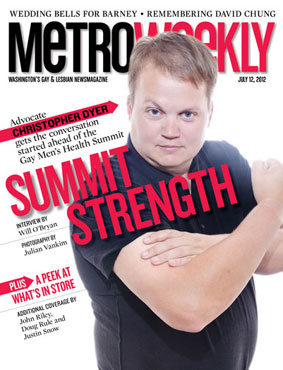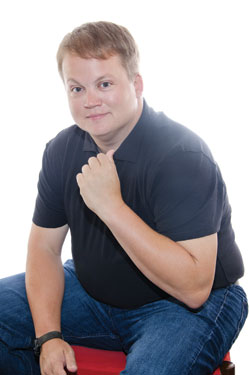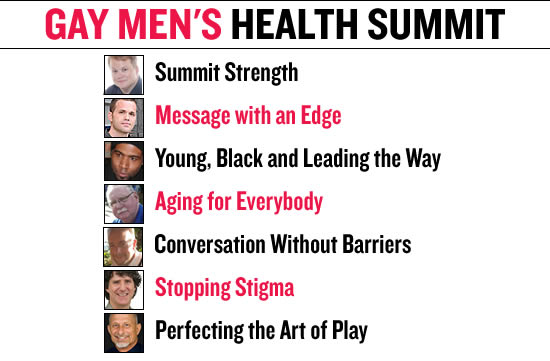As the District prepares for the XIX International AIDS Conference, aka AIDS 2012, locals are preparing a smaller gathering for the days just prior. And, though smaller, this Gay Men's Health Summit may have even more to say to at least three letters of the LGBT acronym than AIDS 2012. Certainly, gay men's health in this decade goes far beyond one virus – even if HIV has cruelly demanded our attention and our sacrifices for decades.
That's not to say the summit is devoid of HIV/AIDS. One of the roughly 35 workshop/panels, however, sort of puts it in context: ''HIV: 30 Years of Fear, Stigma. How to Move Forward.'' The Gay Men's Health Summit, first held in Boulder, Colo., in 1999, tries to look at gay men as whole individuals, as a community, and at their connections to the rest of the world. This is not health defined as not being sick, but of health as an expression of wellbeing – mind, body and soul.

Christopher Dyer
Christopher Dyer, 42, founder of the Youth Pride Alliance, former director of the Mayor's Office of GLBT Affairs – the man sometimes known to shake his moneymaker for a good cause as drag alter ego Cookie Buffet – is one of the men helping to organize the summit. Others are David Mariner, executive director The DC Center, the city's LGBT community center; Raymond Robbins, also of The DC Center; Blake Cornish and David Phillips. Thanks to them, the Gay Men's Health Summit will make its D.C. debut July 20 and 21, under a simple theme of ''Resiliency. Activism. Advocacy.''
Metro Weekly takes a look at some of the diverse lineup being readied for these two days community conclave.
First, however, to help get the ball rolling, Dyer offered Metro Weekly some of his own history with health, his sobriety, and the value of self-esteem.
METRO WEEKLY: How has health been part of your career?
CHRISTOPHER DYER: I went to college in Ithaca, N.Y., a history major. I remember getting some sort of HIV training. The thing that stuck out for me was, when you're taking a trick home, or when you're sleeping with someone for the first time, tell them what your status is and ask them what their status is. I wonder if that happens now, 22 years later. That stuck out with me as something very empowering.
MW: Some people might be offended by that today.
DYER: In the 1980s and '90s, when people were still dying in droves, some of the finer points of political correctness kind of went out the window. It was stay alive.
In '99 I got a job with the American Association of Colleges and Universities using HIV and AIDS as a way to teach liberal education. I looked at various curriculums of how colleges and universities used HIV/AIDS as a course and to teach civic engagement.

Christopher Dyer
(Photo by Julian Vankim)
After '99 I was involved with Capital Pride, got to know Whitman-Walker.
In 2002, I got hired to work at the American Lung Association. You can't move in the ALA without dealing with public health. I met a ton of MPHs – master's of public health. I saw some of the stuff around smoking, knew the latest and greatest in smoking prevention.
Around 2003, I [joined] the Crystal Meth Working Group. We did the first crystal meth-prevention campaign with Ed Bailey and others, ''Crystal Meth Sucks.'' With crystal meth, being on the Mayor's [LGBT] Advisory Committee under [Mayor] Tony Williams, I think I actually tried to help develop a survey assessing the capacity of the HIV groups and how they were spending money.
Everything sort of changed in 2007 when I started in the mayor's office [as director of Mayor Adrian Fenty's Office of GLBT Affairs]. We were kind of destroying ourselves. There were some prominent members of the community doing this to themselves, also some of the people who'd been involved in health work, struggling with substance abuse.
In the Mayor's Office of GLBT Affairs, I paid attention to HIV, but it wasn't a strong focus, because we have an HIV/AIDS Administration. For the most part, they were doing a reasonably good job, I thought. But every year, the surveillance report would come out and for two or three weeks afterward I'd kind of flip out a little, get very concerned, very worried. One year, Clarence [Fluker, program manager, Office of GLBT Affairs] kind of pulled me aside and said, ''Why don't we do something about this?'' And so we started convening meetings with all the HIV providers to start figuring out some LGBT stuff. And then the clock ran out on me, Fenty got knocked out of office.
MW: And now you're a consultant?
DYER: I'm a consultant.
MW: How much of that is health-related?
DYER: Right now, all of it. I'm consulting primarily with Whitman-Walker Health on a variety of stuff, including the ''Return to Lisner'' event that's happening on the 24th. There's some interesting stuff going on at Whitman-Walker. We've had some ''community conversations'' on issues. We did a ''Five for Pride'' campaign during Pride season to sort of encourage improving self-esteem.
And I've been, as a volunteer, helping out with the Gay Men's Health Summit.
MW: What's your role, exactly?
DYER: Well, we don't have titles, but I'm essentially the facilitator of the programming committee. I basically did all the logistics of setting up meeting, organizing the review panels, getting the information out, selecting some of the programs and being in charge of all the speakers and all the logistical details of getting the program together.
MW: How much history do you have with the Gay Men's Health Summit?
DYER: I went to my first one in 2008. That was in Seattle. It was a fascinating experience. The thing that was interesting about 2008 – the summit's been going since 1999 – was there had been a gap, it hadn't happened for a couple years. That's why Seattle was very important. The summit was back! [Laughs.]
I thought it was going to be a professional education summit, and it was – but it's also a little bit different. People go also to recharge and connect, to re-establish connections with the cadre of folks across the country who are doing gay men's health. I was one of the only senior government folks there. The way the summit operates, we don't really stand on titles, but I expected more public health departments to send people to these things. So I kept quiet, to a degree, because it was my first summit and I didn't want to offend anyone. Then, in one of the sessions, as we were coming up with ideas to improve health, someone raised their hand and said, ''I don't understand why we don't try to do a health campaign around, you know, esteem.'' Like this idea that Frank Kameny had of ''Gay is good.'' What would this look like? When I got back, I started tagging every one of my Facebook posts, ''Gay is good.'' Now people quote it back to me.
So I'm developing a workshop [for the 2012 GMHS] about how to build a national health movement around self-esteem. What does that look like?
MW: Is there any template for that?
DYER: I don't know if there's a template or not. But we'll have the beginning of what a template looks like, of how you can make change in your own organization. How you can change your own life, your own universe.
MW: What sort of grade would you give the gay male community of America when it comes to looking after our own health?
DYER: I'd give us a B or a B-plus. I think we do look after ourselves. But looking at our community as a whole, I don't know if we go beyond ourselves much. It's kind of an interesting pathology on my part to want to be a health advocate.
MW: You could argue gay men have some strange values regarding health. Like, some of us might prefer using steroids to be buff, than being overweight. Or that it's more acceptable to talk about getting really drunk than to talk about being sober.
DYER: I think there's always a voice in the back of people's minds: Do I have a problem? If you're hanging our with a group of men you've been drinking with and you've done the shots and the boozy weekends, and your relationship is based, in part, on getting hammered, it's incredibly threatening when one of your friends decides to get sober. I have had conversations go completely south in bars when I've been trying to pick up boys. When they find out I'm sober, and they're drunk, it doesn't work out. [Laughs.]
But that conversation can happen at a beach house in Rehoboth. It can happen in a Grindr message. I have friends who are active alcoholics, and I know it's a tough conversation to have. But it's an important conversation.
A year before I got sober, I met the women who got me in [to treatment]. I asked her if she wanted to go drinking with me. She explained that she was in [Alcoholics Anonymous]. I immediately started talking to her about my drinking and asked her if I had a drinking problem. She would smile and say, ''That's something you'll have to figure out on your own, sweetie.'' [Laughs.] But then she'd drop hints.
My thought is, if we could train people in the community to feel comfortable talking to their friends about their drinking, to pull their friends aside after a bender and say, ''I love you to death, but I'm extremely concerned that you blacked out a couple days ago. Have you thought about getting some help?'' If we could have that conversation, have that cohort of people, I think we'd make some significant changes. I'd like to have some conversations – we've had these at Whitman-Walker – about, you know, ''I'm really glad you met Joe, but why were you barebacking?''
I didn't just get sober one day because I woke up and realized I was drinking too much. I had at least 25 different people in some way or another, intentionally or unintentionally, point out to me that my drinking was out of control and it wasn't normal behavior. That collective sort of intervention – even though people might not have been aware that they were doing and intervention – helped me get sober. But in '93 I got sober, which was in itself a miracle.
MW: Again, it's probably more of a taboo in our community, and others, to discuss alcoholism than to be an alcoholic.
DYER: As someone who is openly sober in bars, I get a very interesting response. I spend a ton of time in bars. I love show tunes in JR.'s on a Monday. It's a fun, fantabulous night. I go to karaoke on Tuesdays and I have a great frickin' time. I go to Town nightclub occasionally on Friday and Saturday night and dance around and act the fool.
MW: Sometimes you're even on the stage.
DYER: Sometimes I'm on the stage. And I am very open about being sober, and I get an incredibly interesting reaction from people. Most of it's, ''Good!'' Some are really surprised that I'm not drinking. ''Why not?'' ''Because I'm sober.'' And then I get the ones who are reaching out in a way they're not aware of. They'll justify to me that they don't have a drinking problem.
MW: Talking about these different issues, it strikes me that when you bring up the idea of a gay men's health summit, plenty of people are still going to think, ''HIV/AIDS summit?''
DYER: Right. It's the elephant in the room. However, there have always been these other issues. There's still a reluctance to talk about the really big elephant in the room, which is the collective impact of coming out and dealing with basically not feeling like you're connected, and the impact of self-esteem on the health of gay men. And a reluctance of gay men – I think lesbians have the same issues, and bisexuals and the transgender community – in talking about how we can be nicer to each other, how we can help our self-esteem, for ourselves and our community. How we can be involved in each other's lives in a way that happened initially with HIV, but still needs to happen.
I don't want to say we're all victims, because we're not. We're a pretty strong, tough community. You come out of the process on the other side, being more able to stand up for yourself.
MW: With the summit, what's your invitation for local guys who may think a health summit has nothing to do with them? Why should somebody not working in health take a look?
DYER: Because we're citizens of the world. This affects us. It's about us. Look at the program. The things being talked about are things that have to be adopted by members of the community. We can talk about theory all we want, but unless community members actually come in and are engaged in spreading the message and becoming evangelists, so to speak, on health and taking care of yourself, nothing's going to change.
MW: Do you have anything to add to that?
DYER: Get involved. Talk to your friends. Talk to your neighbors about being healthy – other than just going to the gym. Don't be afraid to have the conversations. Get your HIV tests. Get involved in community organizations. Give money to community organizations. Continue to be fabulous. And, finally, gay is good.
The Gay Men's Health Summit will be held Friday, July 20, and Saturday, July 21, at George Washington University. Registration is $85, or $65 for students and senior citizens. One-day registration is also available for $45. For more information visit gmhs2012.org.
